- Clone
- IA6-2 (See other available formats)
- Regulatory Status
- RUO
- Other Names
- Ig delta chain C region
- Isotype
- Mouse IgG2a, κ
- Ave. Rating
- Submit a Review
- Product Citations
- publications
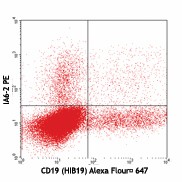
-

Human periperhal blood lymphocytes stained with purified IA6-2 conjugated with PE and CD19 (HIB19) Alexa Fluor® 647
| Cat # | Size | Price | Quantity Check Availability | Save | ||
|---|---|---|---|---|---|---|
| 348202 | 500 µg | 104€ | ||||
IgD, a member of the immunoglobulin (Ig) family, is expressed in naïve B cells. It has 3 Ig-like domains and exists in a transmembrane and a soluble form. In general, IgD is not secreted and usually its expression is lost after the Ig isotype switch. After antigen binding, IgD signals through the CD79a/CD79b (Igα/Igβ) heterodimer, resulting in the activation of the B cell.
Product DetailsProduct Details
- Verified Reactivity
- Human
- Antibody Type
- Monoclonal
- Host Species
- Mouse
- Immunogen
- Human IgD
- Formulation
- Phosphate-buffered solution, pH 7.2, containing 0.09% sodium azide.
- Preparation
- The antibody was purified by affinity chromatography.
- Concentration
- 0.5 mg/ml
- Storage & Handling
- The antibody solution should be stored undiluted between 2°C and 8°C.
- Application
-
FC - Quality tested
IHC-F - Reported in the literature, not verified in house - Recommended Usage
-
Each lot of this antibody is quality control tested by immunofluorescent staining with flow cytometric analysis. For flow cytometric staining, the suggested use of this reagent is ≤0.5 µg per million cells in 100 µl volume. It is recommended that the reagent be titrated for optimal performance for each application.
- Application Notes
-
Additional reported applications (for the relevant formats) include: immunohistochemical staining of paraformaldehyde fixed frozen sections4 and spatial biology (IBEX)5,6.
- Application References
-
- Chen K, et al. 2009. Nat. Immunol. 10:889.
- Lee CH, et al. 2005. J. Exp. Med. 203:63.
- Sutter JA, et al. 2008. Clin. Immunol. 126:282.
- Li H and Pauza CD. 2015. Eur. J. Immunol. 45:298. (IHC)
- Radtke AJ, et al. 2020. Proc Natl Acad Sci USA. 117:33455-33465. (SB) PubMed
- Radtke AJ, et al. 2022. Nat Protoc. 17:378-401. (SB) PubMed
- Product Citations
-
- RRID
-
AB_10550095 (BioLegend Cat. No. 348202)
Antigen Details
- Structure
- Exists in a transmembranal and a soluble form
- Distribution
-
Naïve B cells
- Function
- Antigen binding, B cell activation
- Interaction
- The CD79a/CD79b heterodimer
- Cell Type
- B cells
- Biology Area
- Immunology
- Antigen References
-
1. Geisberger R, et al. 2006. Immunology 118:429.
2. Weller S, et al. 2005. Eur. J. Immunol. 35:2789.
3. Brandtzaeg P and Johansen FE. 2005. Immunol. Rev. 206:32. - Gene ID
- 3495 View all products for this Gene ID
- UniProt
- View information about IgD on UniProt.org
Related FAQs
Other Formats
View All IgD Reagents Request Custom ConjugationCustomers Also Purchased
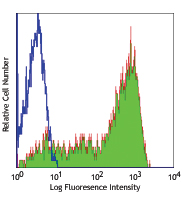

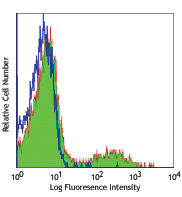
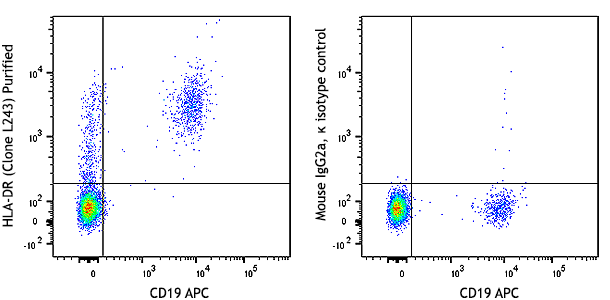
Compare Data Across All Formats
This data display is provided for general comparisons between formats.
Your actual data may vary due to variations in samples, target cells, instruments and their settings, staining conditions, and other factors.
If you need assistance with selecting the best format contact our expert technical support team.
-
Alexa Fluor® 647 anti-human IgD
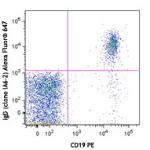
Human peripheral blood lymphocytes were stained with CD19 PE... 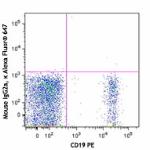
-
PerCP anti-human IgD
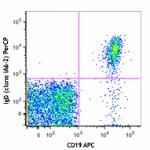
Human peripheral blood lymphocytes were stained with CD19 AP... 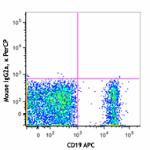
-
Brilliant Violet 605™ anti-human IgD
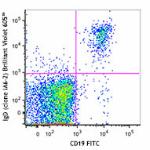
Human peripheral blood lymphocytes were stained with CD19 FI... 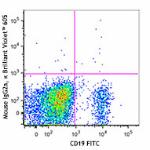
-
Alexa Fluor® 700 anti-human IgD
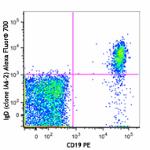
Human peripheral blood lymphocytes were stained with CD19 PE... 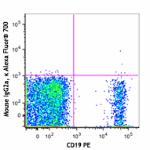
-
Purified anti-human IgD
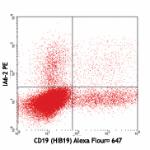
Human periperhal blood lymphocytes stained with purified IA6... -
PE anti-human IgD
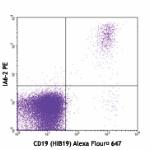
Human periperhal blood lymphocytes stained with IA6-2 PE and... -
Biotin anti-human IgD
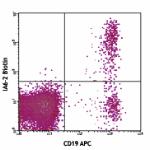
Human peripheral blood lymphocytes were stained with CD19 (c... 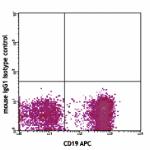
-
FITC anti-human IgD
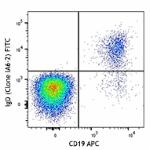
Human peripheral blood lymphocytes were stained with CD19 AP... 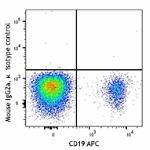
-
PerCP/Cyanine5.5 anti-human IgD

Human peripheral blood lymphocytes stained with CD19 APC and... -
PE/Cyanine7 anti-human IgD
-
Alexa Fluor® 488 anti-human IgD
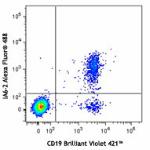
Human peripheral blood lymphocytes were stained with CD19 Br... 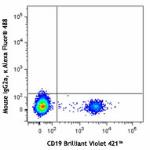
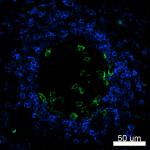
Confocal image of human lymph node sample acquired using the... -
APC/Cyanine7 anti-human IgD

Human peripheral blood lymphocytes were stained with CD19 Br... -
Brilliant Violet 510™ anti-human IgD
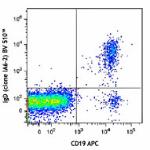
Human peripheral blood lymphocytes were stained with IgD (cl... -
APC anti-human IgD
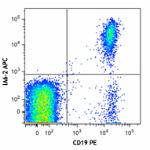
Human peripheral blood lymphocytes were stained with CD19 PE... 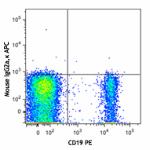
-
Pacific Blue™ anti-human IgD
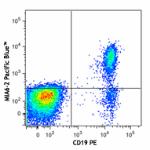
Human peripheral blood lymphocytes were stained with CD19 PE... 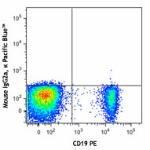
-
Brilliant Violet 421™ anti-human IgD
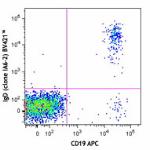
Human peripheral blood lymphocytes were stained with CD19 AP... 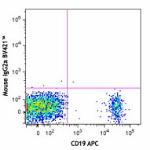
-
Purified anti-human IgD (Maxpar® Ready)
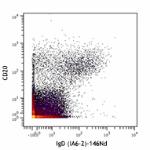
Human PBMCs stained with 147Sm-anti-CD20 (2H7) and 146Nd-ant... -
PE/Dazzle™ 594 anti-human IgD
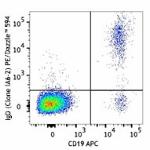
Human peripheral blood lymphocytes were stained with CD19 AP... 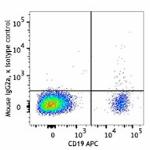
-
APC/Fire™ 750 anti-human IgD
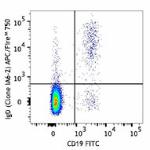
Human peripheral blood lymphocytes were stained with CD19 FI... 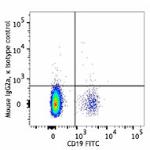
-
Brilliant Violet 785™ anti-human IgD
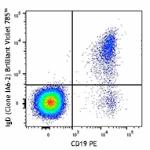
Human peripheral blood lymphocytes were stained with CD19 PE... 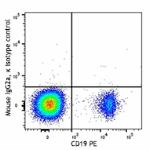
-
TotalSeq™-A0384 anti-human IgD
-
TotalSeq™-C0384 anti-human IgD
-
TotalSeq™-B0384 anti-human IgD
-
PE/Cyanine5 anti-human IgD

Human peripheral blood lymphocytes were stained with anti-hu... -
TotalSeq™-D0384 anti-human IgD
-
Spark UV™ 387 anti-human IgD

Human peripheral blood lymphocytes were stained with anti-hu... -
PE anti-human IgD

Typical results from human peripheral blood lymphocytes stai...
 Login / Register
Login / Register 







Follow Us